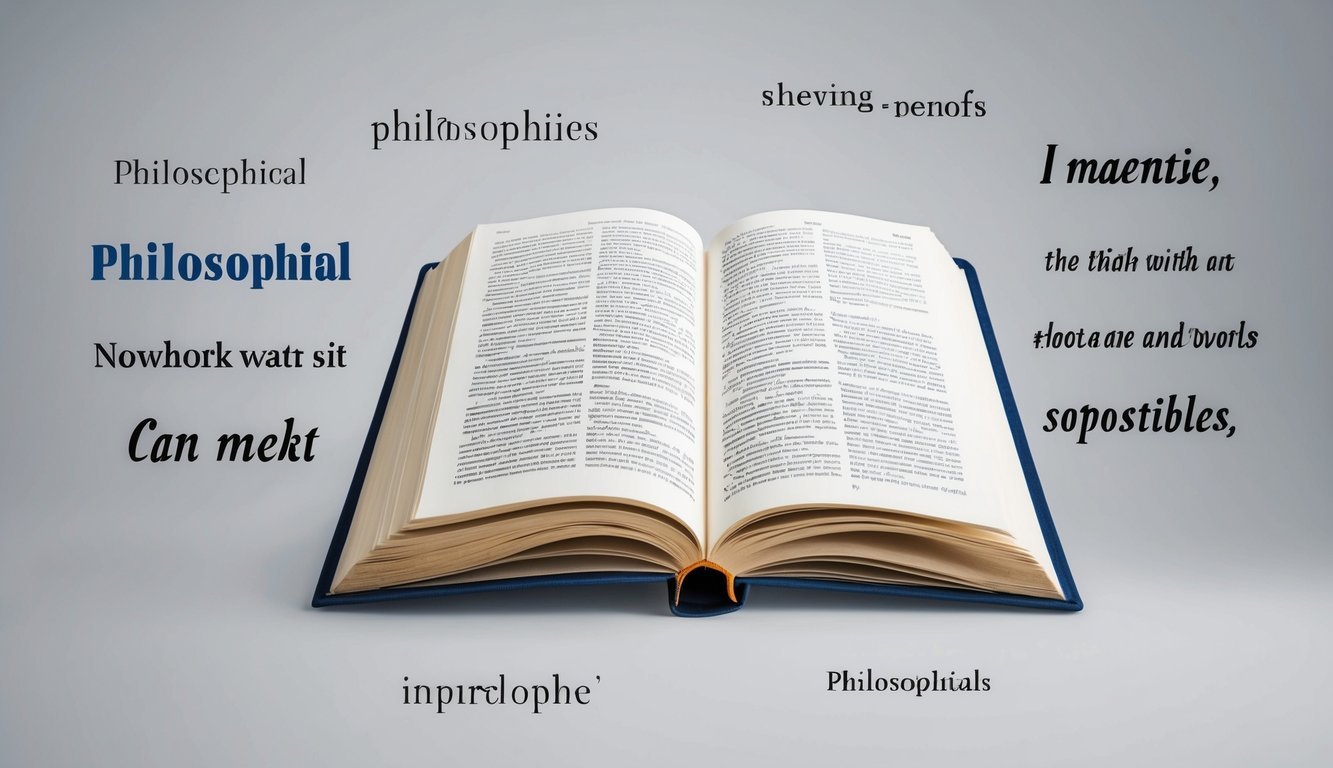PsychNewsDaily Publishers
100 Summit Drive
Burlington, MA, 01803
Telephone: (320) 349-2484
PsychNewsDaily Publishers
100 Summit Drive
Burlington, MA, 01803
Telephone: (320) 349-2484
Philosophy promotes deep thinking and self-reflection, encouraging personal growth through quotes from thinkers like Socrates, Buddha, and Aristotle, addressing life, freedom, and personal responsibility.

Philosophy encourages deep thinking and self-reflection. Many quotes from famous thinkers invite individuals to explore different perspectives and insights. These quotes can inspire personal growth and help people consider their own beliefs and choices.

In a world filled with information, philosophical quotes provide a guiding light. They cover a wide range of topics such as life, love, and success. Each quote offers a unique way to ponder important questions and stimulate meaningful conversations.

Socrates, a famous Greek philosopher, believed that self-reflection is key to a meaningful life. He argued that simply going through daily routines without questioning them leads to a life without purpose. This quote encourages people to think deeply about their values and beliefs. By examining their lives, individuals can discover what truly matters to them.
Socrates thought that knowledge is essential for a good life. He believed that without understanding oneself and one’s choices, life loses its significance. Reflecting on one’s experiences can lead to personal growth and a clearer sense of direction. It helps individuals make better choices and live more intentionally.

Martin Heidegger reminds us that thinking deeply can lead to mistakes. Great ideas often come with risks. When people aim high, they sometimes stumble along the way.
Heidegger’s quote encourages a balance between ambition and caution. It shows that mistakes are part of the journey to understanding. Each error can teach a lesson and provoke deeper thought.
This quote resonates with many thinkers. They realize that exploring big concepts can lead to new insights. Errors, in this context, aren’t failures but stepping stones to greater knowledge.
Through this lens, one can appreciate the value of reflection. Thoughtful mistakes can spark discussion and open new paths. They play a key role in the pursuit of wisdom.

Buddha’s quote highlights the power of thoughts. It suggests that what a person believes and focuses on shapes their reality. When someone thinks positively, they are more likely to experience positive outcomes. This idea encourages individuals to take charge of their mindset.
Negative thoughts can limit one’s potential. By changing thoughts, a person can change their path in life. This quote inspires reflection on personal beliefs. It urges people to consider how their thinking influences their actions and feelings.
In everyday life, practicing mindfulness can help in recognizing thoughts. With awareness, individuals can make better choices and foster a growth mindset.

This quote from Buddha highlights how anger can harm the person holding onto it. When someone clings to anger, they may think it affects others. In reality, it often causes more pain for themselves.
The image of a hot coal is powerful. Just like a person cannot throw a coal without getting burned, holding onto anger leads to suffering. It serves as a reminder to let go of negative feelings.
Letting go of anger can bring peace and happiness. It allows for healing and growth. Buddha encourages people to release what does not serve them. By doing so, they can move forward with less weight on their hearts.

This quote by Socrates emphasizes the connection between existence and action. It suggests that who a person is can be understood through what they do.
For Socrates, actions define character. Simply existing isn’t enough; people must engage with the world around them. It challenges individuals to think about their choices and behaviors.
By reflecting on this quote, one can consider how actions reflect values and beliefs. It encourages personal growth through meaningful activities.
Ultimately, “to be is to do” invites everyone to take responsibility for their actions and their impact.

Jean-Paul Sartre was a prominent philosopher. His quote “To do is to be” captures a key idea in his thinking.
This statement suggests that actions define who a person is. In other words, what someone does is a reflection of their true self. It reminds people that behavior shapes identity.
Sartre believed that individuals are responsible for their actions. They cannot separate what they do from who they are. Each choice contributes to their existence.
This quote encourages self-reflection. It makes individuals think about their daily actions and choices. By examining what they do, they can understand themselves better.
Sartre’s view can inspire a mindful approach to life. It highlights the importance of living authentically. When individuals align their actions with their values, they create a meaningful life.

Frank Sinatra’s phrase “Do be do be do” is playful and catchy. It comes from one of his famous songs and captures a lighthearted spirit.
The phrase suggests a carefree attitude towards life. It reminds people to enjoy the moment and be themselves.
Sinatra’s words carry a sense of joy and simplicity. They encourage listeners to embrace their true selves without worry.
This quote resonates with many who appreciate the importance of enjoying life. It reflects a philosophy of living in the present and not taking things too seriously.
In a world filled with stress, “Do be do be do” serves as a cheerful reminder to relax and have fun.

Albert Camus offers a powerful idea about freedom. He suggests that in a world where people feel trapped or controlled, true freedom comes from within.
To be absolutely free means to live life on one’s own terms. Camus believes this kind of freedom can challenge oppressive situations.
When a person embodies freedom, they inspire others. Their very presence can shine a light on the injustice around them.
This quote highlights the importance of individual choice. It encourages everyone to think about what it means to be free in their own lives.
By making choices that affirm their freedom, people can push back against an unfree world. Camus’s words remind us that freedom is more than a state; it’s a way of living.

Søren Kierkegaard encourages people to accept their true selves. By facing facts about who they are, individuals can start to grow and change.
This quote highlights the importance of self-awareness. Recognizing one’s strengths and weaknesses is the first step toward personal development.
Kierkegaard believed that honesty with oneself is vital. When people acknowledge their reality, they can make meaningful changes in their lives.
This idea resonates with many today. It reminds them that change begins from within. Understanding and accepting oneself is crucial for building a better future.

This quote from Buddha encourages self-reliance. It highlights the idea that personal growth is up to each individual. No one else can do it for them.
Buddha’s message is clear. He reminds people that they hold the power to change their lives. Relying on others can lead to disappointment.
Walking the path means taking responsibility for one’s own journey. This can inspire people to take action. They can find strength within themselves to overcome challenges.
Self-improvement starts from within. When individuals embrace this idea, they can make positive changes. This quote serves as a guide for those seeking deeper understanding and peace.
It suggests that everyone has the tools needed to find their way. Each person’s path is unique, and they must navigate it themselves. This tailored journey can lead to greater fulfillment in life.

Søren Kierkegaard was a Danish philosopher known for his deep thoughts on life and existence. His quote invites people to think about their past while moving into the future.
Understanding life backward means reflecting on experiences and learning from them. It encourages individuals to think about mistakes and successes.
Living forward highlights the importance of taking action and looking ahead. It reminds people to make choices based on their understanding of the past.
This balance between reflection and action helps individuals grow. By learning from earlier experiences, they can shape a better future for themselves.

Jean-Paul Sartre was a key thinker in existentialism. His quote speaks to the idea of freedom and responsibility.
When he says that man is “condemned to be free,” he means that everyone has the freedom to make choices. This freedom can feel like a burden. Once a person makes a choice, they must live with the consequences.
Sartre believed that life does not come with built-in meaning. Instead, it is up to each person to create their own purpose. This idea stresses the importance of personal responsibility.
Every action taken has weight. Individuals shape their lives based on the decisions they make. This reflects a powerful message about owning one’s life and choices.
By embracing freedom, individuals can find their own path. This quote encourages reflection on how freedom influences life. It invites people to think about how they choose to act in the world.

Socrates was a Greek philosopher famous for his thoughts on knowledge and wisdom. This quote reflects his belief that true wisdom begins with recognizing one’s own limits.
By admitting that he knows nothing, Socrates opened the door for learning. He encouraged others to question their beliefs and seek greater understanding.
This mindset helps people remain humble. It reminds them that there is always more to discover.
Socrates’ ideas invite individuals to think deeply. They promote curiosity and a desire to learn from others.
This quote is a reminder to keep an open mind. It inspires people to embrace new ideas and experiences.

Confucius reminds people that beauty exists in many forms. It can be found in nature, art, and even in small acts of kindness.
Many may walk through life without noticing the beauty around them. A simple flower or a kind gesture can have deep meaning.
This quote encourages individuals to open their eyes and hearts. By doing so, they can appreciate the world in a richer way.
Finding beauty requires awareness and an open mind. It invites everyone to take a moment and reflect on what is often overlooked.
By embracing this attitude, people can lead more fulfilling lives. Being aware of beauty can bring joy and happiness each day.
Epictetus was a Stoic philosopher who taught the importance of personal response to life’s challenges. This quote emphasizes that events can be beyond a person’s control. What truly matters is how they choose to respond.
Life will bring difficulties and surprises. Some things may seem unfair or hurtful. In these moments, the way a person reacts can shape their future.
Choosing a positive response can lead to growth and resilience. It’s about finding strength in adversity and learning from experiences. This perspective helps in managing stress and improving well-being.
People often spend time worrying about external events. Instead, focusing on internal reaction promotes mental clarity. It empowers individuals to take charge of their feelings and actions.
Albert Camus was a French philosopher known for his thoughts on human existence. His quote about hope encourages people to take action, even in tough times.
When hope seems lost, Camus suggests that people should create their own. This idea can inspire individuals to find strength within themselves. It reminds them that they have the power to change their situations.
People often face challenges that can feel overwhelming. In these moments, imagining new possibilities can lead to motivation. Instead of waiting for hope to arrive, taking initiative can lead to new paths and opportunities.
Camus’ words remind everyone of the importance of resilience. By inventing hope, individuals can spark change in their lives. This perspective can be especially helpful during difficult periods.
René Descartes is known for his famous quote, “I think therefore I am.” This phrase suggests that the act of thinking is proof of existence.
When a person doubts or questions their own thoughts, it shows that they are conscious and aware. This idea is a key point in philosophy.
Descartes used this concept to establish a foundation for knowledge. He believed that if one can think, they must exist in some form.
This quote encourages people to reflect on their own thoughts and existence. It highlights the importance of self-awareness and critical thinking.
For many, this simple statement opens up deeper questions about life and reality. Descartes invites everyone to explore their own thoughts and what they mean.
This quote by Mahatma Gandhi encourages individuals to take action. It suggests that to inspire change in the world, one must begin with themselves.
Gandhi believed that every person has the power to make a difference. He emphasized personal responsibility and the idea that change starts from within.
By embodying the values they wish to see, people become role models for others. This creates a ripple effect, where positive actions inspire more positive change.
This message remains relevant today. It challenges individuals to reflect on their actions and values. Each small step can lead to bigger changes in society.
Through commitment and effort, people can contribute to a better world. The simplicity of this idea makes it profound and powerful.
Socrates, a great philosopher, believed that true wisdom comes from recognizing one’s own limitations. He famously stated, “The only true wisdom is in knowing you know nothing.”
This idea encourages people to stay humble. It reminds everyone that there is always more to learn. When individuals admit their lack of knowledge, they open themselves up to new ideas and experiences.
Many find this quote inspiring because it promotes curiosity. By accepting that they don’t know everything, people can seek knowledge and understanding more deeply.
Socrates’ message supports the importance of questioning and reflection. It pushes individuals to explore new thoughts rather than cling to what they think they know. This quote serves as a guiding principle in the pursuit of wisdom.
Marcus Aurelius shared this thought to highlight the power of mindset. He believed that how a person thinks can shape their reality.
When someone focuses on positive thoughts, they can create a more fulfilling life. Conversely, negative thoughts can lead to unhappiness and stress.
This quote encourages self-reflection. It reminds people to be aware of their thoughts and how they influence their feelings and actions.
By changing negative thoughts into positive ones, individuals can improve their outlook. This shift can lead to personal growth and better experiences.
Aurelius’ insight is helpful for anyone looking to lead a happier life. By embracing this idea, people can learn to harness their thoughts to shape their reality.
Plato believed that true wealth comes from being satisfied with what one has. This idea encourages people to find joy and peace in simplicity.
In a world that often values material possessions, this quote serves as a reminder. It suggests that happiness does not depend on having a lot of things.
Living with less can lead to a richer life. This perspective helps people focus on relationships, personal growth, and contentment.
By appreciating small pleasures, individuals can lead more fulfilling lives. Plato’s words inspire reflection on what really matters in life.
Fyodor Dostoevsky highlights a deep truth about life. Simply existing is not enough. People often seek a greater purpose beyond survival.
Finding something to live for can bring joy and fulfillment. It could be love, passion, or a personal goal. This drive helps shape a meaningful life.
Dostoevsky’s words encourage reflection. They remind individuals to explore what truly matters to them. Pursuing these passions can lead to a richer, more rewarding experience.
In a world where daily routines can feel monotonous, this quote inspires a shift in perspective. It invites everyone to consider their own motivations and dreams. Embracing a purpose can transform how one approaches each day.
Amit Ray’s quote highlights the importance of being present. It encourages focus on the now rather than worrying about the past or future.
Living in the moment can help reduce stress and anxiety. When people concentrate on their breath, it brings them back to the present.
Mindfulness practices, including breathing techniques, support emotional well-being. They allow individuals to notice their thoughts without judgment.
Breathing deeply grounds people and helps calm their minds. By focusing on each breath, worries can feel less overwhelming.
This quote reminds everyone that life unfolds in the present. Embracing each moment can lead to a more peaceful state of mind.
Plutarch believed that a person’s inner life directly affects their outer world. When someone works on their thoughts, feelings, and beliefs, they can bring about change in their actions and environment.
This quote encourages deep reflection. It suggests that achieving personal growth can lead to positive changes in life. Focusing on inner values can shape how one interacts with others.
For Plutarch, self-improvement is vital. He thought that inner success often leads to outer success. When people cultivate kindness and wisdom inside, it often flows out into the world around them.
By attending to inner thoughts, individuals can create a more fulfilling and productive life. This quote serves as a reminder that change starts from within.
Aristotle’s quote highlights the idea that actions define a person’s character. It suggests that excellence is not just a single achievement. Instead, it comes from consistent practice and effort.
When individuals focus on their daily habits, they shape their skills and outcomes. Repeated actions lead to improvement and growth over time. This idea shows the importance of persistence.
This quote encourages people to commit to their routines. By doing so, they can reach their goals and develop good habits. It reminds everyone that success results from what they regularly practice, not just a one-time effort.
Philosophy quotes carry significant meaning and can influence thoughts and actions profoundly. They often inspire reflection and self-awareness, guiding individuals through life’s challenges. The following subsections explore how these powerful words affect the mind and provoke deeper understanding.
Words have immense power, especially in philosophy. A well-crafted quote can resonate deeply, sparking new ideas or perspectives. For example, when someone reads, “Life can only be understood backwards; but it must be lived forwards,” it prompts them to think about their experiences and choices.
Philosophical quotes challenge assumptions and encourage critical thinking. They can serve as a reminder to stay true to oneself and to question societal norms. When individuals engage with these words, they may find motivation to rethink their beliefs or behaviors.
Reflecting on philosophical messages leads to personal growth. Quotes like, “Always remember you are braver than you believe,” can help bolster self-esteem. These messages often remind individuals of their intrinsic worth and potential.
Taking time to ponder these quotes can ignite insights. For instance, considering how quotes relate to everyday life can make them more impactful. By reflecting on their meanings, individuals can apply these lessons to real situations, aiding in decision-making and personal development.
Philosophy comes in many forms, shaped by culture and history. These perspectives offer rich insights into life, ethics, and personal growth. Here are key viewpoints from both Eastern and Western traditions.
Eastern philosophy often emphasizes harmony and balance. Central to this thought are concepts from traditions like Buddhism, Taoism, and Confucianism.
These ideas inspire people to seek inner peace and understand their place in the world.
Western philosophy is rich with ideas about reason, ethics, and human nature. It draws from thinkers like Socrates, Aristotle, and Kant.
These philosophies encourage deep reflection on personal responsibility and the pursuit of knowledge. Each perspective offers valuable lessons in understanding oneself and how to engage with others.
This section provides answers to common questions about philosophical quotes. It explores deep thoughts, reflections on self-discovery, and quotes that influence life perspectives.
Many deep philosophical quotes prompt reflection. For example, Socrates said, “The unexamined life is not worth living.” This encourages individuals to reflect deeply on their lives and choices.
Reflective quotes can inspire personal growth. One notable quote is from Buddha: “The mind is everything. What you think you become.” This stresses the importance of mindset in shaping one’s identity.
Certain philosophical quotes can change how one views life. Martin Heidegger stated, “He who thinks great thoughts, often makes great errors.” This reminds people that risks and mistakes are part of great achievements.
Humor can make philosophy more approachable. For instance, a humorous take might state, “I don’t know where I’m going, but I’m on my way!” This adds a lightness to the often serious nature of deep thought.
Work-inspired quotes encourage mindfulness in professional life. Buddha’s line, “Holding on to anger is like grasping a hot coal with the intent of throwing it at someone else; you are the one who gets burned,” serves as a lesson in dealing with workplace conflicts.
Many philosophical sayings focus on personal development. Socrates’ quote, “To be is to do,” emphasizes action as a pathway to discovering one’s true self.